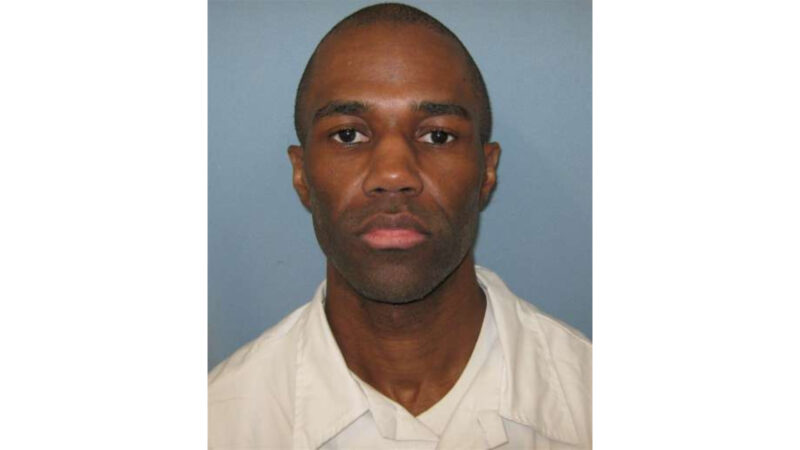Alabama set to execute a man with nitrogen gas for 1991 murder and rape
ATMORE, Ala. (AP) — A man convicted of murdering a woman after breaking into her apartment is set to be executed Thursday in Alabama in what would be the nation’s fourth execution with nitrogen gas.
Demetrius Terrence Frazier, 52, was convicted of the 1991 murder of 41-year-old Pauline Brown. Prosecutors said Frazier raped and shot her after breaking into her Birmingham apartment.
If carried out, Frazier’s execution will be the third in the United States in 2025 and the first in Alabama this year.
Alabama became the first state to carry out executions with nitrogen gas when three inmates were put to death using the method last year. The method involves placing a respirator gas mask over the person’s face to replace breathable air with pure nitrogen gas, causing death by lack of oxygen.
Frazier had no pending court appeals in the hours leading up to his execution. His advocates instead made a plea to the governor in another state to intercede. Frazier’s mother and death penalty opponents asked Michigan Gov. Gretchen Whitmer to bring Frazier back to Michigan, where he was serving a life sentence for the murder of a 14-year-old girl before he was turned over to Alabama’s death row. Michigan does not have the death penalty.
“I know my son has changed. Demetrius has repented,” his mother, Carol Frazier, wrote in a letter. “Please don’t let Alabama kill my son,” she added.
Whitmer has not commented on the request. However, the Michigan attorney general’s office wrote in a January court filing that the state did not want Frazier back.
“While Michigan takes no position on the imposition of the death penalty in this case, Michigan does not seek to return Frazier to a Michigan correctional facility,” state attorneys wrote.
Frazier was convicted of separate killings in 1991 in Alabama and in 1992 in Michigan, but he was convicted in the Michigan case first.
Prosecutors said on Nov. 27, 1991, that Frazier, then 19, broke into Brown’s apartment through a window while she was asleep. Prosecutors said he demanded money and raped Brown at gunpoint after she gave him $80 from her purse. He then shot her in the head. He later returned to the apartment to have a snack and look for money, prosecutors said.
Frazier confessed to Brown’s killing in 1992 while in custody in Michigan, police said.
He was sentenced to life in prison in Michigan for the 1992 murder of 14-year-old Crystal Kendrick. Then in 1996, an Alabama jury convicted him of murdering Brown and recommended by a vote of 10-2 that he receive a death sentence. All states but two — Alabama and Florida — now require a unanimous agreement for a death sentence.
Frazier remained in Michigan custody until 2011 when the then-governors of the two states agreed to move him to Alabama’s death row.
A federal judge last week rejected a request to block Frazier’s execution. His attorneys argued the new execution method does not work as quickly as the state promised. Media witnesses, including The Associated Press, described how those put to death with the method shook on the gurney at the start of their executions.
The judge ruled that the descriptions of the prior three executions do not support a finding that any of the men “experienced severe psychological pain or distress over and above what is inherent in any execution.”
House Dem. Leader Jeffries responds to air strikes on Iran by U.S. and Israel
NPR's Emily Kwong speaks to House Minority Leader Hakeem Jeffries (D-NY), who is still calling for a vote on a war powers resolution following a wave of U.S.- and Israel-led airstrikes on Iran.
Iran’s Ayatollah Ali Khamenei is killed in Israeli strike, ending 36-year iron rule
Khamenei, the Islamic Republic's second supreme leader, has been killed. He had held power since 1989, guiding Iran through difficult times — and overseeing the violent suppression of dissent.
Found: The 19th century silent film that first captured a robot attack
A newly rediscovered 1897 short by famed French filmmaker Georges Méliès is being hailed as the first-ever depiction of a robot in cinema.
‘One year of failure.’ The Lancet slams RFK Jr.’s first year as health chief
In a scathing review, the top US medical journal's editorial board warned that the "destruction that Kennedy has wrought in 1 in office might take generations to repair."
Here’s how world leaders are reacting to the US-Israel strikes on Iran
Several leaders voiced support for the operation – but most, including those who stopped short of condemning it, called for restraint moving forward.
How could the U.S. strikes in Iran affect the world’s oil supply?
Despite sanctions, Iran is one of the world's major oil producers, with much of its crude exported to China.




